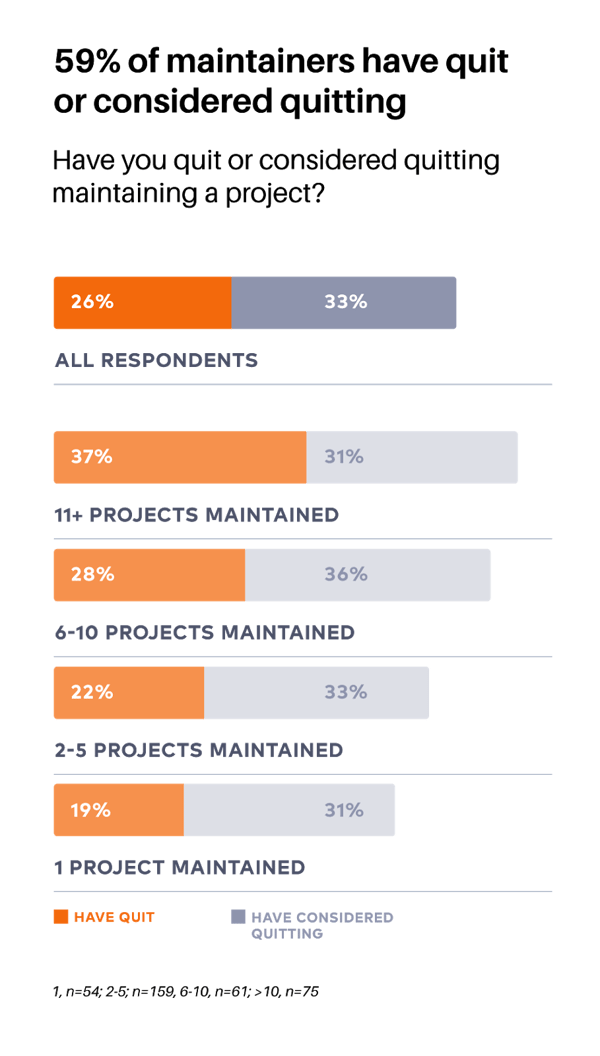In early 2021, Tidelift fielded its first-ever comprehensive survey of open source maintainers. Nearly 400 maintainers responded with thoughts about how they fund their work, what they enjoy about being a maintainer, what they don’t like so much, along with a host of other interesting insights. In this post, we share the fifth of nine key findings. If you don’t want to wait for the rest of the results, you can download the full survey report right now.
In our previous post, we asked maintainers to share what they dislike about their work and learned that it is often stressful, thankless, and financially unrewarding.
Based on that data you might not find this next data point surprising: a whopping 59% of maintainers we surveyed have quit or considered quitting maintaining a project.
 Also, the more projects a maintainer is responsible for, the more likely it is that they have considered quitting, with over two thirds of maintainers responsible for over 10 projects having quit or considered quitting maintaining a project.
Also, the more projects a maintainer is responsible for, the more likely it is that they have considered quitting, with over two thirds of maintainers responsible for over 10 projects having quit or considered quitting maintaining a project.
We asked maintainers who’ve quit or considered quitting to share why. The number one most likely reason to quit, with 60% citing it, was that “other things in my life and work took priority.”
.png?width=600&name=Tidelift_051321_SurveyMaintainerReport_09_Figure%205.2%20(1).png)
Burnout was the next most commonly mentioned reason, with half of maintainers citing it as a reason for quitting or considering quitting.
Burnout becomes even more of a factor for quitting, rising from being cited by 50% of respondents to 64% if the maintainer ranked “personal stress involved with project maintenance” as one of the top things they dislike about being an open source maintainer.
What’s causing maintainers to feel burned out? The answer is pretty obvious: the amount of time and stress involved in maintaining projects isn’t balanced by the rewards. Respondents that dislike the added personal stress of being a maintainer were 14% more likely to say that burnout and excessive time requirements were reasons they considered quitting. This helps add context to what it actually means to be burnt out.
Others quit because they lost interest (45%), it took up too much of their time (44%), they weren’t getting paid enough to make it worthwhile (32%), they didn’t enjoy the maintenance work (31%), or they were overwhelmed by demands from users (28%).
Why—despite the issues—some maintainers persevere
While 59% of maintainers have quit or considered quitting, only a quarter of them actually followed through. So why did maintainers who considered quitting, but didn’t, stick with their projects?
For many, there is a feeling of responsibility. One respondent said, they didn’t quit because of “a sense of duty and commitment to existing users.”
A sense of duty can easily turn into feelings of guilt or worse. For example:
“I have a real sense of despair about ever properly transitioning my projects to new maintainers; I assume that one day I'll stop maintaining them and my reputation will take a nosedive as they all slowly break.”
One maintainer didn’t quit because they “found good co-maintainers to help out.” In other words, they didn’t have to do everything by themselves anymore, perhaps helping relieve the sense of loneliness maintainers cited as another thing they dislike about the work. This also fits in with the sense of community that 52% of maintainers cite as something they enjoy about being a maintainer.
Some maintainers held off the urge to quit by taking a break from the project or resetting expectations for what they were willing to do. Here are several quotes exemplifying this approach:
- “I tend to reduce effort level and time I check in on projects, but continue maintenance at a slow pace. I tend to get invested in the social and community aspect, and the other long-term maintainers, so won't entirely quit, just take vacation for a while and come back... later.”
- “I'm doing the lowest level maintenance until I either give up completely or find my mojo again.”
- “I made the decision to continue maintaining the project after shifting parts of my life to better suit my maintainer duties and switching to handle a different area of the project that was more enjoyable.”
Ah, work-life balance. How exactly does a maintainer—especially one not being paid well for their maintenance work—manage their day? We’ll explore how a maintainer divides up their time in the next post.

 50 Milk St, 16th Floor, Boston, MA 02109
50 Milk St, 16th Floor, Boston, MA 02109